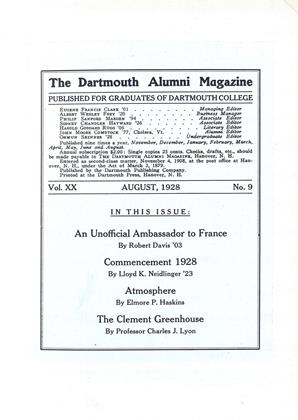The following editorial from the July 14 issue of the "Saturday Evening Post" comments favorably upon the recent action of the Dartmouth Athletic Council in abolishing major and minor sport distinction:
A tendency away from overemphasis of one branch of athletics at the expense of another is indicated by the recent action of Dartmouth College and the University of Pennsylvania in dropping the existing distinctions between major and minor sports. These institutions feel that the terms "major" and "minor" tend to emphasize unduly the present so-called major sports and minimize the value of the minor sports.
By removing these distinctions, which have been in vogue for the past fifty years, it is hoped to remove the stigma of inferiority from sports labeled "minor" and to encourage young men to go out for all sports.
The time, energy and ability demanded by the minor sports often equal or exceed _ those of the major sports. In many cases it has been harder for a minor-sports athlete to obtain his insignia than for the boy who sports the big block letter emblematic of membership on a major team. At Pennsylvania a player on a minor sports team was required to win an intercollegiate championship before recognition by the Council on Athletics. Under the new order of things boxing, wrestling, swimming, water polo, gymnastics, fencing, tennis, lacrosse and golf will be governed by the same system of awarding insignia that applies to football, baseball, track, crew and basketball.
At Dartmouth a summary of student opinion was obtained before the radical step was taken. The supervisor of athletics was surprised to learn that forty-three per cent of those voting were in favor of abolishing all major and minor distinctions. Of those voting against it, many of them, upon thinking the question over care" fully, came around to the idea that major and minor distinctions were of no benefit. Only five per cent were satisfied with the previous classification or were not interested.
That other colleges will probably fall in line with the movement is shown by the fact that Cornell, New Hampshire, the University of Illinois, the University of lowa, Wesleyan, and Williams have already revised or are contemplating the revision of their whole system of awarding insignia to participants in sports. Such a democratization of intercollegiate athletics is a healthy symptom and is a longdeferred recognition of the many who sweat and strain for their alma maters in lowly capacities far from the blare of the band and the spotlight of fame.—Saturday Evening Post.
 View Full Issue
View Full Issue
More From This Issue
-
 Article
ArticleTHE UNOFFICIAL AMBASSADOR TO FRANCE
August 1928 By Robert Davis '03 -
 Article
ArticleEditorial Comment
August 1928 -
 Article
ArticleMEETING OF ALUMNI COUNCIL
August 1928 -
 Books
BooksGREEK THOUGHT IN THE NEW TESTAMENT.
August 1928 By Charles D. Adams -
 Sports
SportsSUMMARY OF ATHLETIC SCORES
August 1928 -
 Class Notes
Class NotesClass of 1918
August 1928







